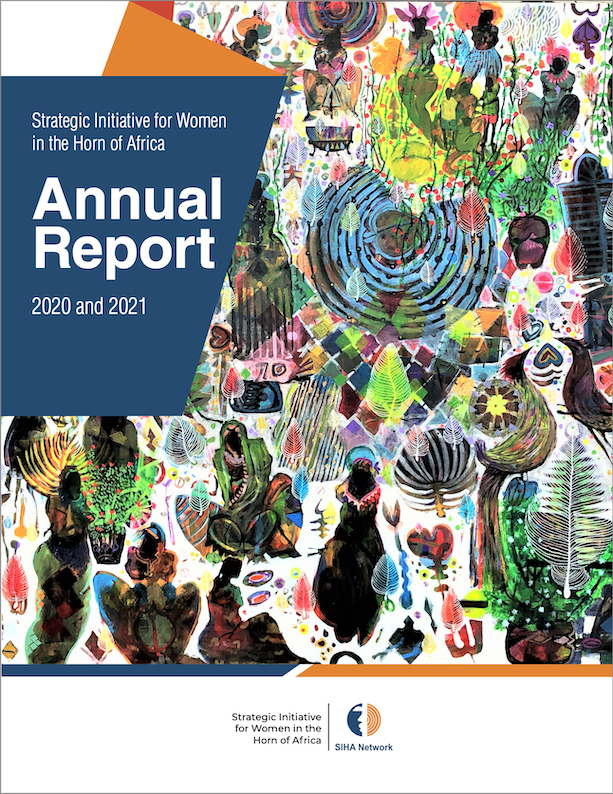
Dear Friends and Colleagues:
It is our pleasure as the SIHA management team to share with you our report for 2020 and 2021 of our journey of successes and challenges and learning throughout the two years.
The past two years have been extremely intense. In addition to the ramifications of COVID-19, the shrinking of civic space and the polarised political environments in the region have caused greater instability and turmoil, particularly in Sudan and Ethiopia.
Against all odds, in different countries across the region, women have been asserting their agency and claiming leadership and decision-making roles, despite these efforts, violence against women and inequalities persist.
Beginning in 2020 and throughout 2021, SIHA has been experiencing significant growth in terms of projects and workload and thus expansion in the size of the operation and human resources. Having said that, SIHA continues to be a southern-based institution that is surviving on projects-based funding, with very limited access to unrestricted funds to utilise for institutional development and sustainability.
As the SIHA management team, we would like to appreciate the commitments of the SIHA team, particularly their diligence and hard work in supporting women and girls in civil society and grassroots activists across the region. Despite limited resources SIHA has managed to have a remarkable group of staff who are trying their best under political, economic, and environmental challenges. We remain grateful to our extremely supportive board of directors and advisors for their collaboration and commitment to SIHA and its future in the region. SIHA’s work and engagement are becoming more trusted and appreciated by grassroots women activists, particularly the younger generation of women activists and feminists. In 2021 our membership base expanded further, especially in Sudan and Ethiopia. We also take pride in our growth and the national, regional, and international recognition that we are enjoying as a feminist institution in this troubled region of the greater Horn of Africa.
SIHA‘s research and knowledge-sharing work is influencing the narrative, establishing awareness, and informing policy change across the greater Horn of Africa. We are especially proud of how our work is informing feminist research and shaping the awareness of a broad base of women and men. Over the past two years, SIHA has produced a number of research papers, and manuals for practitioners, teachers, lawyers and community mediators, along with our annual journal Women in Islam, a unique collection of articles, artwork, and prose that has attracted hundreds of readers from around the globe.
Despite all the difficulties and limitations, SIHA has continued to lead in its advocacy work and to expose the escalating violence against women and girls. Our advocacy is intentional in empowering women and girls in the region as it reflects their voices and tells their/our stories and the situation of women and girls. We also believe that our advocacy agenda and work are influencing the response and the engagement of many regional, national, and international actors.
Our advocacy work with diverse groups of women’s rights defenders and women and girl leaders, as individuals and members of organisations and groups emphasises that women have political and civil rights equal to men and that their engagement in politics is central to any possible change toward stability, democracy and peace in the region.
It is important to note that SIHA’s rapid growth comes at the expense of heavy compliance procedures and higher management requirements. The SIHA Regional Director and Management team are spread thin across SIHA’s six operation locations, making it challenging to invest in institutional development. Having said that, we certainly believe that it is extremely important to invest in staffing and expertise that will support SIHA human resource management and extend support to the SIHA team across the different countries and in the regional office.
Finally, at SIHA we are working on improving our commitment to diversity, among the women’s movement across the region. We feel that we have many limitations and challenges to overcome on that front, as we continue to struggle and rise up to be a diverse institution that reflects the diversity of the movements across the region. The concept of intersectionality is key in our work and commitment to women and communities across the region. The intersectional approach remains critical for acknowledging the layers and complexity of repression, alienation, and violence that women and girls are experiencing in this region.
– SIHA Management Team
